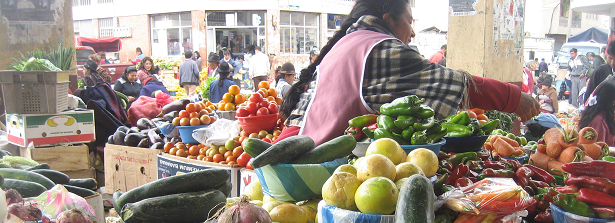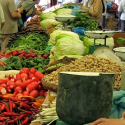Food Systems Governance Mechanisms

Globally, a transformation of the food system is needed to achieve SDG2 and other SDGs.1 Who gets to decide what a future food system looks like and who will take the lead are key questions in this process. These questions have hardly been addressed in the international ‘food systems’ discourse so far. Hence, a recent meeting of the Dutch Community of Practice on food systems was held that looked at food systems governance mechanisms. Participants jointly developed new ideas, such as to include power dynamics analysis within existing food systems frameworks and to develop effective incentives for food systems actors’ behaviour change. They also stressed the importance of food systems tools that are applicable in collaborative efforts of researchers and people ‘on the ground’.
Download the complete report “Food Systems Governance Mechanisms – Community of Practice meeting“.
The meeting brought together 30 Food and Nutrition Security professionals from policy, research and practice to explore the following knowledge questions:
- What are key governance mechanisms that influence food system outcomes?
- What are the power dynamics in food systems governance? Who takes the lead, who has decision making capacity for the various parts of the system, whom else has influencing power? And should that be improved, for SDG impact?
- What works to foster behavioural change, in institutions, in companies, societies, systems?
Professor Otto Hospes of Wageningen University presented an academic view on the question what and how to govern in food systems, in view of changing food systems outcomes. How to steer food systems using policies, institutions, politics and power? He referred to the conceptualization of Polly Ericksen, which helps to understand the complexity and components of food systems as adaptive and self-regulating socio-ecological systems throughout the commodity chain from production to consumption. It also helps to see food systems as ‘telecoupled systems’. The framework by Ericksen also has some limitations, as it does not pay sufficient attention to four aspects of governance of food systems, which Hospes thinks are essential to consider:
First, who governs food systems – in the domains of policy, institutions and/or politics? Second, changing food systems is about politics, not only at the national level for example but also at smaller scale: agenda setting, decision making, representation and accountability. Third, there are conflicting values on food, which form the basis for different discourses and institutions: food as a commodity, as a human right, as an ecosystem service. Fourth, connecting different components and actors of complex food systems may lead to greater efficiency and policy integration but also to control and transfer of risks to politically and/or economically weaker parts of a food system.
Food systems governance mechanisms in practice
Three specific cases from applied research and from practice were discussed thereafter, generating insights on how food systems governance is part of food systems analysis and planning, and on mechanisms that are actually applied to enhance the functioning of its governance.
Case 1. Wageningen University & Research. Framework to analyze power dynamics in food systems transitions.
WUR is currently developing an analytical framework on power dynamics in food systems transitions in sub-Sahara Africa and Asia, which will be used in selected case studies in 2020. In this framework power is approached as a more dynamic force than in dominant approaches: as the (in)capacity of actors to mobilize resources and institutions to achieve certain goals.
Case 2. ECDPM. Sustainable Agrifood System Strategies project in Kenya and Tanzania
Within the Sustainable Agrifood System Strategies project, research was conducted on food system governance around indigenous vegetables in Kenya and Tanzania. Together with stakeholders, relevant food system policies, food system actors, and political economy factors were mapped. The leading question was whether diversification, through promoting indigenous vegetables, could contribute to the sustainability of food systems in Nakuru, Kenya and Arusha, Tanzania.
Case 3. Oxfam Novib. Advancing free, prior and informed consent in the practice of banks.
Oxfam and partners use several methodologies to facilitate communities’ voice in decision making related to their livelihoods. An example is the work with banks in view of putting their commitments on free prior informed consent (FPIC) into practice. Based on these FPIC principles and commitments, Oxfam has developed and used a community engagement tool with its partners, which is meant to foster meaningful engagement between the community and the investors.
Mainstreaming governance aspects in food systems research and practice
Key insights from the meeting included:
- Conflicting values within the food system are an interesting insight of today’s discussions.
- Researchers from different academic institutes see the importance to have analytical tools that enable the understanding of power dynamics within the existing frameworks on food systems. This understanding is a basis to identify opportunities to make a difference. One challenge that remains is how to discuss power that is discursive and informal, and how to make this visible.
- Power analyses can help ministries and embassies better understand how things work and how they are involved in these processes, to see if this can help them achieve better impact. Such analyses might also be used for better donor coordination, and to bridge silos. A question that remains is when to analyse power with a programme in mind, and when to engage in this exercise without a programme in mind?
- Still, currently we know very little about power relationships. Following the conceptual framework of the High Level Panel, focusing on nutrition and health, WUR looked at the power of the consumer and found that so far, giving power to consumers has not worked to achieve change. Identifying less traditional allies to achieve change, such as doctors, is the recommended way forward.
- Current global food systems’ governance does not really include the incentives to make actors behave differently. E.g. the FAO cannot ‘bite’.
- Collaborative efforts of researchers and ‘people on the ground’ need tools that are both academically rigorous and on the ground
- To enhance the adequate participation of local communities in decision making on (private) agricultural investments, mechanisms such as Free Prior and Informed Consent can be used. The questions remaining are how to get FPIC in a large number of communities, and how governments can promote this initiative in their regulations.
- We should not expect spatial or geographical boundaries to be boundaries for systems analysis. Boundaries should be fuzzy and soft systems analysis revisited, when elaborating who wants to go where in a transition.
| Documents to download |
|
Footnotes
- 1. See for example a recent report by the World Economic Forum “Incentivizing food system transformation“.






